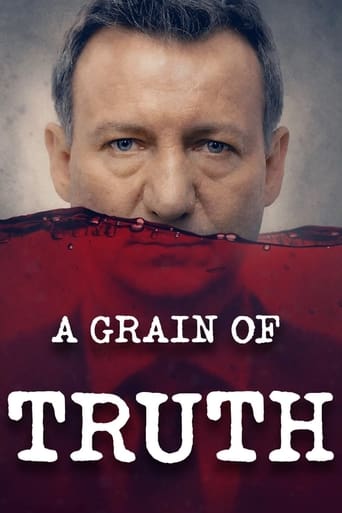maurice yacowar
In Grain of Truth Borys Lankosz uses the conventions of the film noir to anatomize the current resurgence of antisemitism in Europe, in particular the legend that Jews use Christian blood, especially children's, to make matzoh. Detective Teo is the classic noir loner, a disenchanted man, divorced, cut off from his daughter, sent down from Warsaw to solve a murder in the provinces. He's so insensitive to the climate that he innocently refers to the sidelocks of the possible killer, immediately triggering the appreciation of the quietly antisemitic citizens. His detachment drives off his local girlfriend. The film smacks of the Noir shadows and the underground but also deploys the fantastical imagery of classical antisemitism. The title footage of surreal bloodletting, supported by the antisemitic old religious paintings, a Jewish caricature puppet and an apparent Orthodox phantom segues into the realism of the murder case. The actual killer turns out to be Teo's first suspect. But the killer's careful use of Jewish slaughtering techniques and instruments throws the prosecutor off track. He leaves his sense of a crime of passion for the apparent crime of bile. The killer mobilizes antisemitic legend and history to scapegoat the Jewish investigator, who seems out to avenge the loss of his family to the local Nazis. Teo gets his second thought when he remembers the the rabble-rouser who claimed there is always a grain of truth to legends like the Jewish blood libel. Teo remembers that there is no grain of truth to that, so he rethinks the case. He remembers that it was he who — upon only a brief meeting — identified the dead woman's husband as the second corpse and he remembers the missing hobo. The deep tunnel setting, with its hellish hounds and explosion, is an image of the West's subconscious, in which the old hatred of the Jews roils again — without a grain of truth. The bloody painting in the church is covered by a portrait of the Pope — not eradicated. Lankosz's point is that antisemitism is not just an evil falsehood in itself, but an instrument to commit further evil. The killer commits his three murders because he knows he can have them blamed on a Jew. While Poland has a long history of antisemitism, the film applies more widely, as antisemitism is resurging throughout Europe and even on North American campuses. The big lie has taken new root and thrives.
Sonofamoviegeek
A prosecutor in the historical city of Sandomierz investigates two gruesome murders that appear to be based on the medieval legend of the Blood Libel (that the sacrifice of a Gentile baby is needed to make matzo for Passover). To understand this film, one needs to know that there are not one but two churches in Sandomierz that have wooden panels that depict the Blood Libel. The painting in the Cathedral hidden behind a curtain forms part of the plot. The murderer uses the legend and people's need to believe in fantastic conspiracies to deflect suspicion. Before condemning Poles for belief in the unbelievable, consider the persistence of Birthers in North America.The second missing bit of background is that the Polish system of law resembles the French system where an investigating prosecutor leads the investigation rather than a police officer, as in common law jurisdictions such as the United States and the British Commonwealth.Ziarno Prawdy is well written and acted and provides some insight into latent anti-Semitism and the need for a bogeyman to blame for evil. I would give the movie an extra star if it didn't exhibit the Polish need to have extra-gruesome murders for its mysteries.



